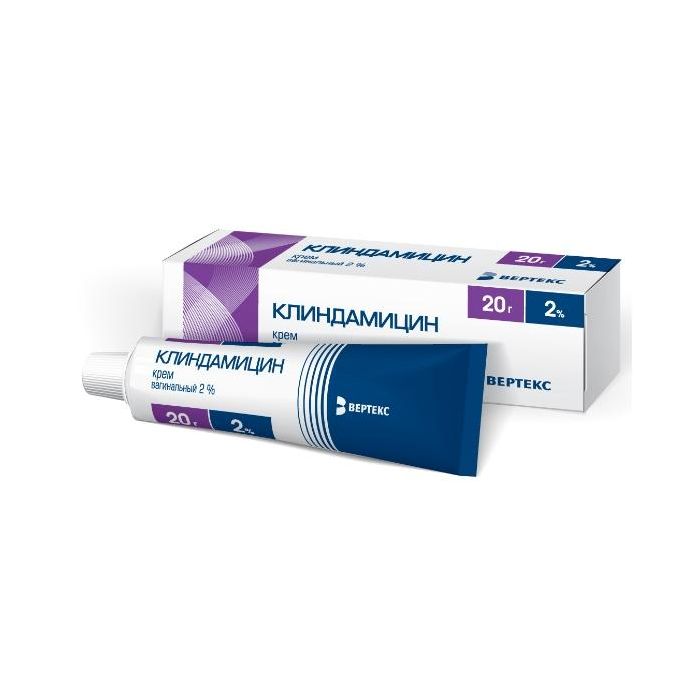clindamycin | clindamycin vaginal cream 2% 20 g
Special Price
$22.54
Regular Price
$30.00
In stock
SKU
BID500158
Packing
Tube 20 g. Packaging
Tube 20 g.
Pharmacological action
A bacteriostatic antibiotic from the group of linkosamides, has a wide spectrum of action, binds to the 50S subunit of the ribosomal membrane and inhibits protein synthesis in the microbial cell.
With respect to a number of gram-positive cocci, bactericidal action is possible.
Active against Staphylococcus spp. (including Staphylococcus epidermidis producing and non-producing penicillinase), Streptococcus spp. (excluding Enterococcus faecalis), Streptococcus pneumoniae, Corynebacterium diphtheriae, Mycoplasma spp., anaerobic and microaerophilic gram-positive cocci (including Peptococcus spp. and Peptostreptococcus spp.), Clostridium perfringens, Clostridens, Clostrid. (including Bacteroides fragilis and Prevotella melaninogenica), Fusobacterium spp., Propionibacterium spp., Eubacterium spp., and Actinomyces israelii.
Most strains of Clostridium perfringens are sensitive to clindamycin, but other species of Clostridium spp. (including Clostridium sporogenes, Clostridium tertium) are resistant to its action, in connection with which, with infections caused by Clostridium spp., the determination of an antibioticogram is recommended.
Cross-resistance exists between clindamycin and lincomycin.
Indications
Vaginitis caused by drug-sensitive microorganisms.
Contraindications
Hypersensitivity, pregnancy I trimester (for vaginal cream).
Use during pregnancy and lactation
During pregnancy, it is possible if the expected effect of therapy exceeds the potential risk to the fetus (adequate and strictly controlled studies in pregnant women have not been carried out, clindamycin passes through the placenta and can concentrate in the fetal liver, but there are no complications in humans registered).
Research has not established whether treatment of bacterial vaginosis reduces the risk of adverse pregnancy outcomes such as premature rupture of the membranes, premature onset of labor, or premature delivery.
Caution should be exercised when used during breastfeeding (it is not known whether clindamycin passes into breast milk after external and intravaginal administration, but found in breast milk after oral or parenteral administration).
Composition
clindamycin
Dosage and administration
Intravaginally: a vaginal cream is prescribed in a single dose - 100 mg of clindamycin (1 applicator) at night, the course of treatment is 3-7 days.
Side effects
Allergic reactions (including skin rash, urticaria).
Irritation at the site of application, cervicitis, vaginitis, development of superinfection (fungal vaginitis).
Drug Interaction
Incompatible with solutions containing group B vitamins, aminoglycosides, ampicillin, phenytoin, barbiturates, aminophylline, calcium gluconate and magnesium sulfate.
Clindamycin antagonism with erythromycin and chloramphenicol has been shown in vitro since this effect may be clinically relevant, these drugs should not be taken at the same time.
Because clindamycin disrupts neuromuscular transmission and can enhance peripheral muscle relaxant action, careful monitoring and careful monitoring should be exercised when administered concurrently.
When used with opioid (narcotic) analgesics, respiratory depression may increase, up to apnea. Concurrent administration with anti-diarrheal drugs that reduce gastrointestinal motility increases the risk of pseudomembranous colitis.
Overdose
Symptoms: increased severity of side effects.
Treatment: symptomatic and supportive. It is not excreted by hemodialysis and peritoneal dialysis.
Storage conditions
In a dry, dark place at a temperature of no higher than 20 РC.
Keep out of the reach of children.
Do not use after expiration date.
Expiration
2 years.
Formulation
Formulation
cream
Vertex, Russia
Write Your Own Review

